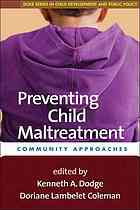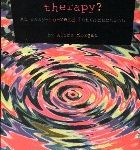Many child abuse prevention programs have targeted factors within the family, such as parenting skills. This book describes the next wave of prevention: the promotion of safer, healthier childrearing environments in entire communities. The contributors are leading authorities who illuminate how contextual factors-including poverty, chaotic neighborhoods, and lack of social supports-combine with family factors to place children at risk for maltreatment. They present a range of exemplary programs designed to strengthen communities while also helping individual parents to meet their children’s needs. Real-world evaluation approaches, quality-control strategies, and policy implications are discussed in depth.
Contents:
- Introduction: Community-Based Prevention of Child Maltreatment, Kenneth A. Dodge and Doriane Lambelet Coleman
- I. The Scientific Basis for the Community Prevention of Child Maltreatment
- 1. The History of Science and Child Abuse Prevention: A Reciprocal Relationship, Deborah Daro
- II. Community Efforts to Prevent Child Maltreatment
- 2. Preventing Child Abuse and Neglect with Home Visiting by Nurses, David L. Olds, John Eckenrode, Charles Henderson, Harriet Kitzman, Robert Cole, Dennis Luckey, John Holmberg, and Pilar Baca
- 3. Toward a Population-Based Paradigm for Parenting Intervention, Prevention of Child Maltreatment, and Promotion of Child Well-Being, Ronald J. Prinz
- 4. Community-Level Prevention of Child Maltreatment: The Durham Family Initiative, Kenneth A. Dodge, Robert Murphy, Karen O’Donnell, and Christina Christopoulos
- 5. How Strong Communities Restored My Faith in Humanity: Children Can Live in Safety, Gary B. Melton
- 6. The Period of PURPLE Crying: Keeping Babies Safe in North Carolina, Desmond Runyan and Adam Zolotor
- III. Policy and Practice Issues
- 7. Quality Improvement in Child Abuse Prevention Programs, Robert T. Ammerman, Frank W. Putnam, Peter A. Margolis, and Judith B. Van Ginkel
- 8. Differential Response, Jane Waldfogel
- 9. Innovations in Child Maltreatment Prevention: Resolving the Tension between Effective Assistance and Violations of Privacy, Doriane Lambelet Coleman
- 10. Healing in the Place of Last Resort: The Role of the Dependency Court within Community-Based Efforts to Prevent Child Maltreatment, Cindy S. Lederman
- 11. Preventing Maltreatment or Promoting Positive Development—Where Should a Community Focus Its Resources?: A Policy Perspective, Michael S. Wald
Review:
“Reports of child abuse have quadrupled since we passed the first national child abuse law in 1974. In this volume, an interdisciplinary group of outstanding scholars demonstrates that our lack of progress in curbing child abuse is due to not properly conceptualizing this saddest of all social problems. This brilliant and convincing work makes clear that we must move from the simplistic view that the primary cause of abuse is misbehaving or pathological parents to an ecological model in which families receive appropriate attention from community support networks.” Edward Zigler, PhD, Sterling Professor of Psychology Emeritus and Director Emeritus, Edward Zigler Center for Child Development and Social Policy, Yale University
“This state-of-the-art volume brings together in one place the conceptual issues, empirical research, and policy analyses relevant to involving communities in child maltreatment prevention. The book provides an excellent overview of established prevention approaches, such as home visiting by nurses, as well as new and promising community-level interventions. It examines some hot topics in child welfare service delivery, including differential response and quality improvement systems, along with such thorny issues as the tension between preventing maltreatment versus promoting positive child development. An invaluable resource for practitioners, advocates, students, policymakers, and researchers interested in the best thinking about efforts to keep children safe.” Mark E. Courtney, PhD, Executive Director, Partners for Our Children; Ballmer Endowed Chair for Child Well-Being, School of Social Work, University of Washington





